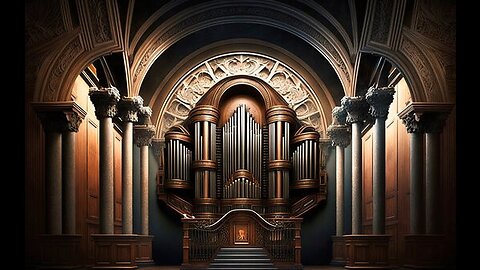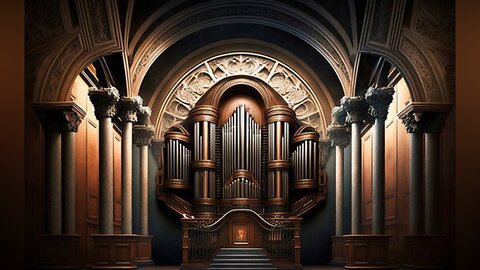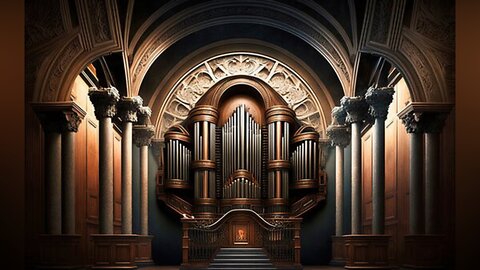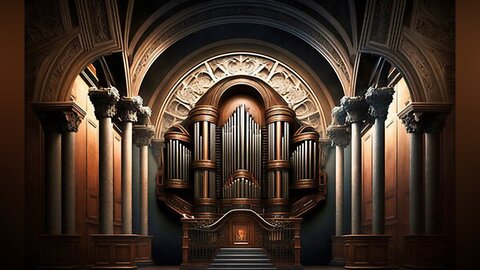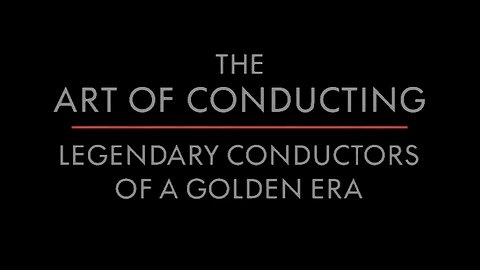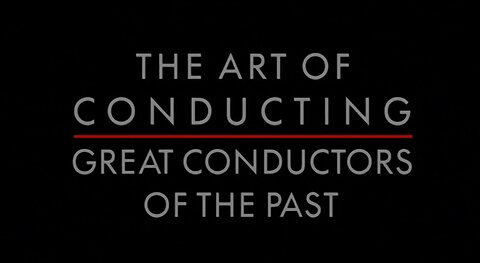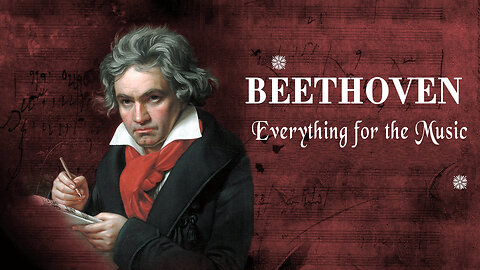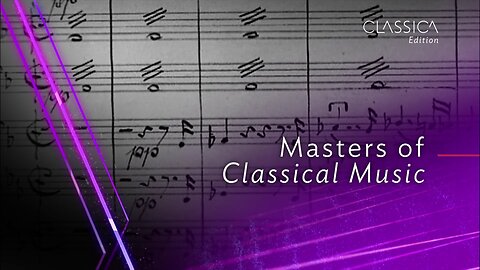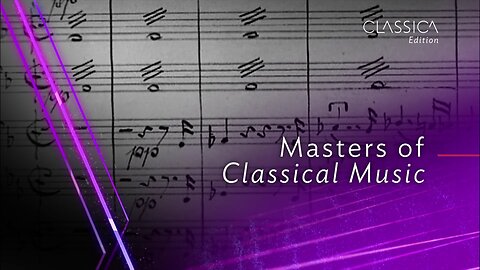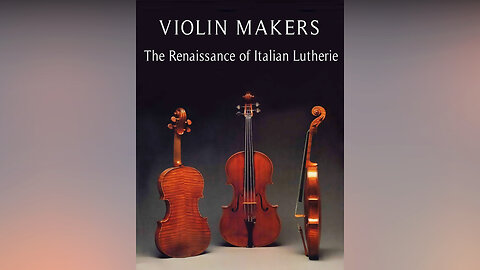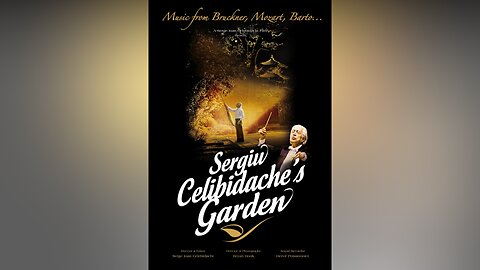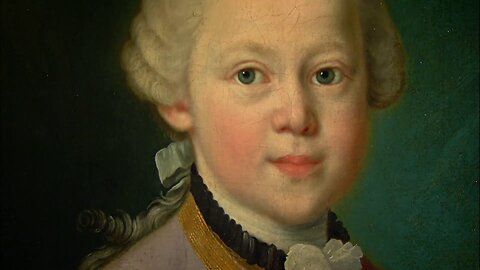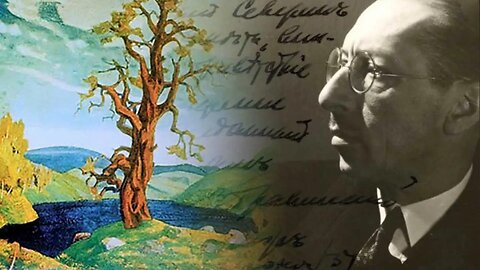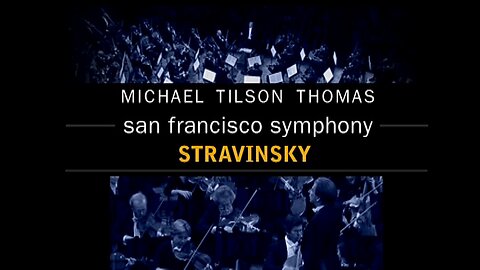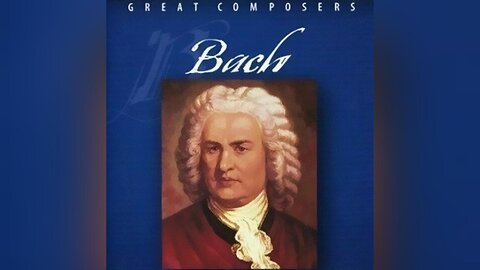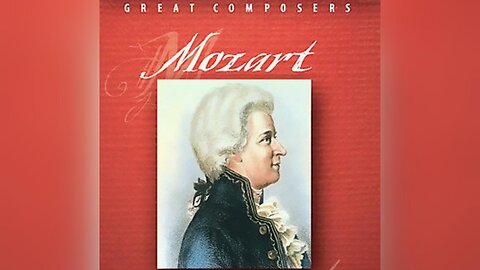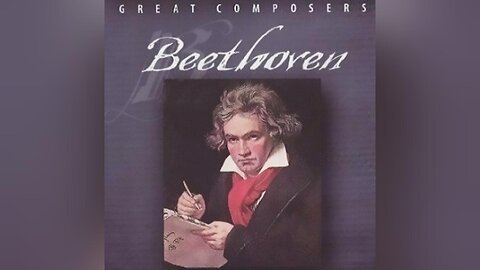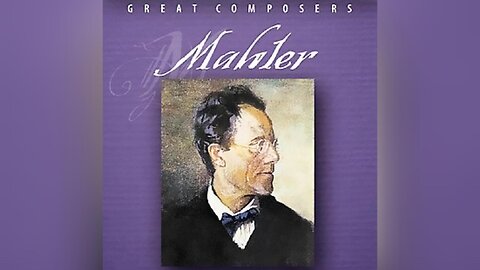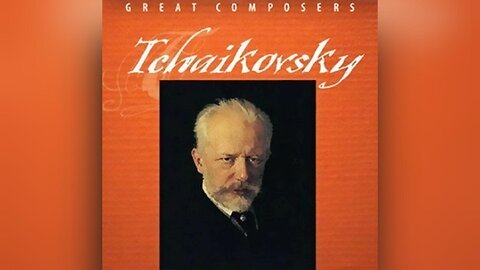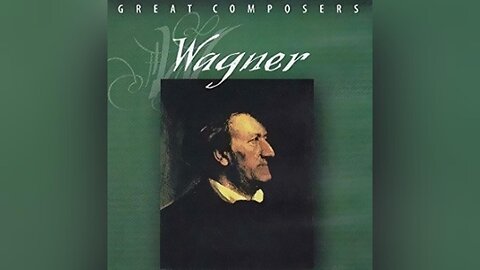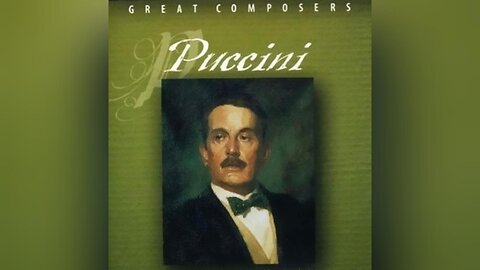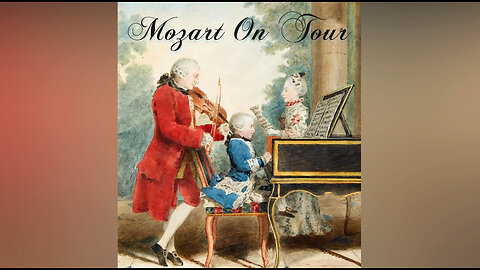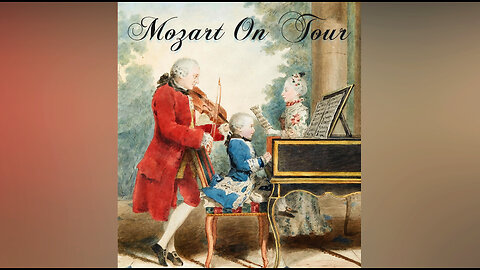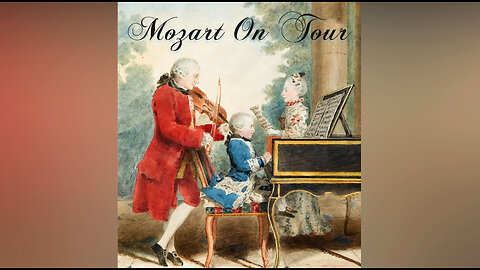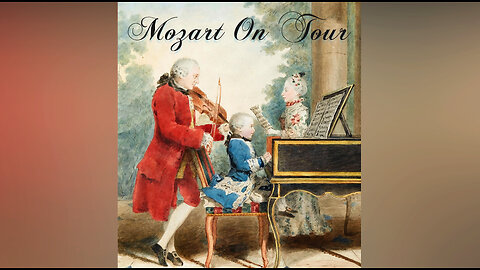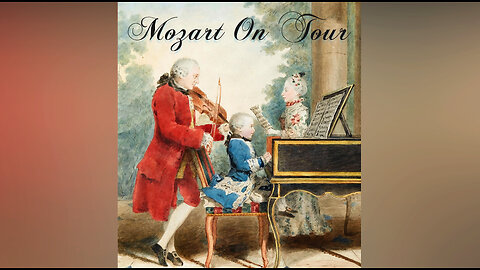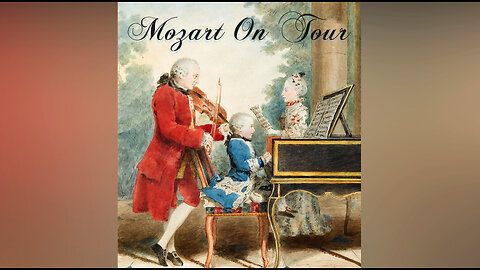Premium Only Content
This video is only available to Rumble Premium subscribers. Subscribe to
enjoy exclusive content and ad-free viewing.
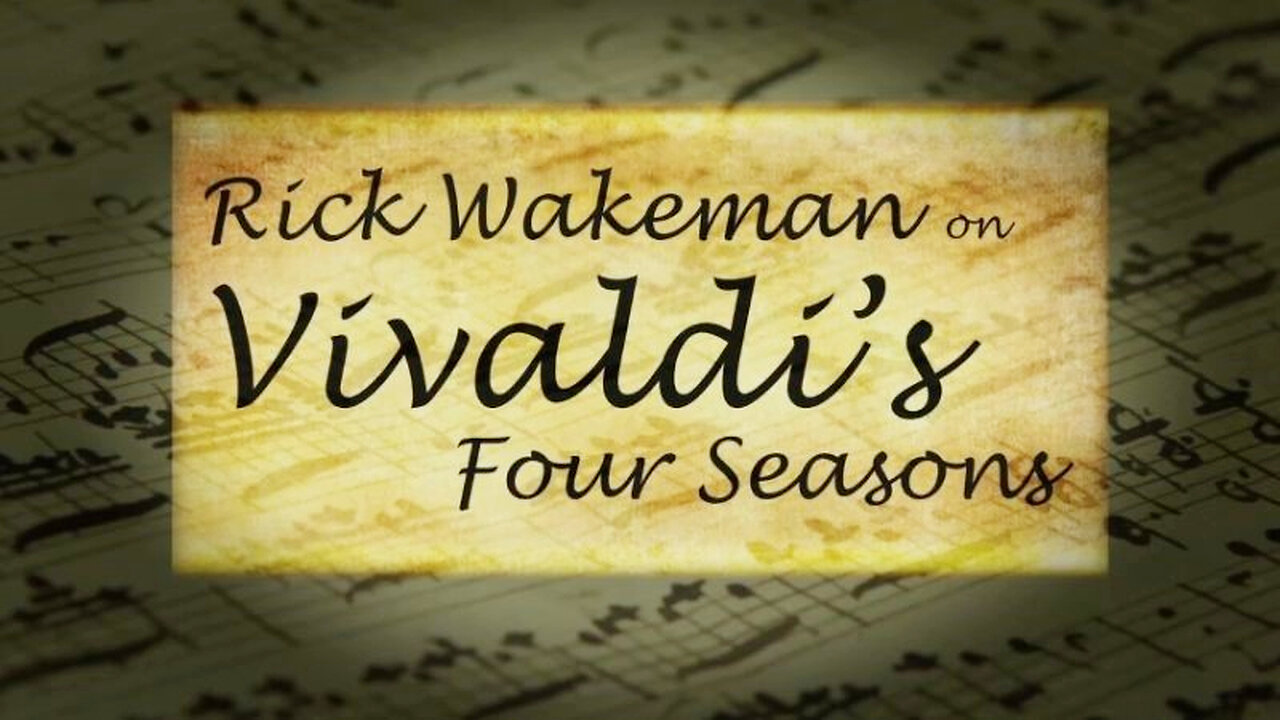
Classical Music (Documentaries)
AdanethArts
- 16 / 44
1
Orlando di Lasso: A Composer's Life in the Renaissance (MULTISUB)
Adaneth - Arts & Literature
A 2022 Documentary directed by Joachim Thôme. Audio in French with subtitles in English, Italian and Spanish (click on CC for subtitles).
In a mixture of music and narrative, this film tells the story of the Franco-Flemish musician Orlando di Lasso (1532-1594). The works of this major Renaissance composer are just as fascinating as his moving life story. Celebrated throughout Europe during his lifetime, he travelled widely and not always willingly as he was kidnapped as a child chorister – not unusual at the time – for his exceptional singing voice.
2
A History of the Organ | Latin Origins (Episode 1)
Adaneth - Arts & Literature
A 1997 RM Arts Arts Documentary narrated by Tim Hardy.
The organ is one of the oldest, most complex and most glorious musical instruments known to man. The four-part series tells the history of this magnificent instrument, displaying the beauty of the sound it produces, the wealth of music written for it, the craftsmanship involved in building such a complicated and often ornate structure and the wonderful settings in which it has come to reside. The journey takes us from Italy, Spain, Germany and France to discover and listen to the changes that make up the history of this wonderful instrument.
Episode 1: Starting out in the Verona workshop of Bartolomeo Formentelli, this episode travels through Italy, Spain and France to trace the origins, history and development of the organ. It encompasses the classical sobriety of the Italian style, the Golden Age of the organ in sixteenth-century Spain, and the French style of the eighteenth century.
Featuring music by Pierre Attaignant, Antonio de Cabezón, Girolamo Frescobaldi, Francisco Correa de Arauxo, François Couperin, Nicolas de Grigny and Louis-Claude Daquin
3
A History of the Organ | From Sweelinck to Bach (Episode 2)
Adaneth - Arts & Literature
Episode 2: Focusing on the influence of the great German school of organ builders in Northern Europe, this episode was filmed in The Netherlands and Germany. With the advent of the Lutheran reforms in the church, the organ became an increasingly widespread and important part of religious worship. The development of organ music from Sweelinck, the ‘maker of organists’, through Buxtehude to the golden age, in which the genius of Johann Sebastian Bach is highlighted, is shown.
Featuring music by Jan Pieterszoon Sweelinck, Dietrich Buxtehude, Matthias Weckmann and Johann Sebastian Bach. Organists: Gustav Leonhardt, Bernard Foccroulle, Hans Heintze
Episode 1: https://rumble.com/v3d7v06-a-history-of-the-organ-latin-origins-episode-1.html
4
A History of the Organ | The Golden Age (Episode 3)
Adaneth - Arts & Literature
Episode 3: This episode focuses on the first half of the 18th Century - the Golden Age of organ music. The French and German school of organ production is presented and works by Marchand, Dandrieu and Johann Sebastian Bach will be played.
Featuring music by Louis Marchand, Johann Sebastian Bach and Jean-Francois Dandrieu. Organists: Xavier Darasse, André Isoir and Gustav Leonhardt
5
A History of the Organ | The Modern Age (Episode 4)
Adaneth - Arts & Literature
Episode 4: Tracing the organ’s development, from the beginning of the nineteenth century to the present day, this episode visits France and Switzerland. The impact of changes in society, tastes and musical styles, as well as technological advances, are examined and illustrated with music by Charles-Marie Widor, Max Reger, Olivier Messiaen and Jehan Alain.
Organists: Marie-Claire Alain, René Saorgin, Louis Robilliard and Xavier Darasse
6
The Art of Conducting II: Legendary Conductors of the Golden Era
Adaneth - Arts & Literature
A 1997 Teldec Classics International production, in association with IMG Artists. Produced by Marcos Klorman, directed by Peter R. Smith. Narrator, Michael Letchford. Most of the audio is in English, subtitles hardcoded.
The Art of Conducting (Legendary Conductors of a Golden Era) has longer portraits of six major conductors of the twentieth century: Sergiu Celibidache, Wilhelm Furtwangler, Erich Kleiber, Willem Mengelberg, Evgeny Mravinsky, and Charles Munch. Also includes rare film clips of Herbert von Karajan, Hermann Scherchen, André Cluytens, and Václav Talich.
Archival footage is complemented by first-hand recollections of these conductors by people who knew them; Yehudi Menuhin, Daniel Barenboim, Bernard Haitink. Peter Andry, Alexander Barantschik, Walter Barylli, Otto Edelmann, Vic Firth, Yuri Grigorovich, Bernard Haitink, and Evgeny Mravinsky.
Music Content:
-Herbert Von Karajan - R. Strauss
-Vaclav Talich - Dvorak
-Hermann Scherchen - Kalinnikov
-Andre Cluytens - Ravel
-Evgeny Alexandrovich Mravinsky - Tchaikovsky, Shostakovich
-Erich Kleiber - Beethoven, J. Strauss II
-Willem Mengelberg - Berlioz, Bizet, Weber
-Wilhelm Furtwangler - J. Strauss II, R. Strauss
-Charles Munch - Franck, Debussy, Ravel, Berlioz
-Sergiu Celibidache - Beethoven, R. Strauss, Dvorak
Participants:
- Sergiu Celibidache with the Berlin Philharmonic Orchestra, the Orchestra of Süddeutscher Rundfunk, and the Munich Philharmonic Orchestra
- Wilhelm Furtwängler with the Berlin Philharmonic Orchestra
- Erich Kleiber with the Concertgebouw Orchestra, the Czech Philharmonic, and the Berlin Staatskapelle
- Willem Mengelberg with the Concertgebouw Orchestra
- Evgeny Mravinsky with the Czech Philharmonic Orchestra and the Leningrad Philharmonic Orchestra
- Charles Munch with the Czech Philharmonic Orchestra, the Boston Symphony Orchestra, and the Hungarian State Orchestra
- Herbert von Karajan with the Berlin Philharmonic Orchestra
- Václav Talich, Hermann Scherchen, and André Cluytens with the Czech Philharmonic Orchestra.
7
The Art of Conducting I: Great Conductors of the Past
Adaneth - Arts & Literature
A 1994 Documentary Film narrated by Michael Gambon. Directed by Gerald Caillat, Sue Knussen and Peter R. Smith. Additional interviews, as an extra bonus material, at the end of the documentary.
This is a fascinating documentary on some of the greatest conductors of all time. A unique program featuring sixteen of the great conductors of the last century in rehearsal and performance. Revealing archive footage is complemented by first-hand recollection's of these legendary conductors by some of the most eminent musicians.
With commentary by John Eliot Gardiner, Isaac Stern, Jack Brymer, Sir Thomas Beecham, Yehudi Menuhin, Oliver Knussen, Suvi Raj Grubb, George Szell, Bruno Walter, Otto Klemperer, Hugh Bean, Werner Tharichen, Richard Mohr, Leopold Stokowski, Julius Baker, Herbert von Karajan.
Featuring in archive footage: Thomas Beecham, Leonard Bernstein, John Barbirolli, Fritz Busch, Wilhelm Furtwängler, Richard Strauss, Arthur Nikisch, Serge Koussevitzky, Otto Klemperer, Jascha Heifetz, Arturo Toscanini, Herbert von Karajan, Serge Koussevitzky, Georg Solti (in TV Broadcast version), Marsha Hunt as Nora Ryan (in clip from 1947 film Sinfonie eterne 'Carnegie Hall'), Leopold Stokowski (Clip from 1947 film Sinfonie eterne 'Carnegie Hall', Frank McHugh as John Donovan (in clip from 1947 film Sinfonie eterne 'Carnegie Hall'), Bruno Walter, Felix Weingartner.
2
comments
8
Mozart - Liberty or Death!
Adaneth - Arts & Literature
A 2018 France TV History Documentary hosted by Stéphane Bern. Audio in French with English subtitles.
Wolfgang Amadeus Mozart is considered a universal genius, whose fate continues to intrigue. In Austria, Stéphane Bern goes to discover the wonders of baroque art, the sumptuous Viennese palaces, the most beautiful operas in Europe, and the Palace of Versailles where, at the age of 6, he had surprised Louis XV with his precocity. An independent and daring traveler, Mozart refused to comply with the demands of the Court and became one of the first "free lance" musicians in the history of music.
“Secrets of History” also lifts the veil on his numerous amorous conquests and on the mysteries surrounding the circumstances of his death.
9
Beethoven - Everything for the Music
Adaneth - Arts & Literature
A 2020 France TV History Documentary hosted by Stéphane Bern. Audio in French with English subtitles.
Stéphane Bern embarks on a journey that will take him to Austria, Germany and the Czech Republic, in the footsteps of one of the greatest composers in history: Ludwig van Beethoven.
Two and a half centuries after his birth, his works continue to be performed and sold all over the world. The man was a visionary who revolutionized his art and bequeathed humanity an exceptional heritage. After growing up in Bonn, Beethoven began his musical career in Vienna where his success hides a terrible secret: the composer has been deaf since he was thirty. He will never hear some of his works.
10
God Rot Tunbridge Wells!
Adaneth - Arts & Literature
God Rot Tunbridge Wells! is a 1985 British musical television film directed by Tony Palmer, written by John Osborne and starring Trevor Howard, Christopher Bramwell and Dave Griffiths. Music conducted by Charles Macferras. It was aired on Channel 4 in 1985 and was made to mark the 300th anniversary of Handel's birth.
Shortly before death, George Fredrick Handel (1685-1759), old, blind, portly, sometimes raging and usually reflective, narrates a look back over his life. As he tells his story, his music plays as background or is performed on screen.
Cast & Characters:
Trevor Howard – Elderly Handel
Christopher Bramwell – Young Handel
Dave Griffiths – Handel in middle age
Isabella Connell – Princess of Wales
Anne Downie – Vittoria Turquini
Beth Robens – Handel's Mother
Simon Donald – Prince Ruspoli
11
Masters of Classical Music | Discovering Bach’s Brandenburg Concertos (Episode 1)
Adaneth - Arts & Literature
A 2015 EuroArts Classical music documentary series.
Do you know why there was a wild brawl at the premiere of Stravinsky's "Sacre du printemps"? Why did Schubert never intend to finish his famous Unfinished Symphony in h-Minor. What is the fate behind Beethoven's "Symphony of Fate"? And what surprise did Haydn have in mind with his symphony of the same name? Expect to be enlightened with these and many other exciting answers to intriguing questions about some of the most famous works of classical music by the documentary series "Masters of Classical Music". Each of the episodes offers an instructive introduction to the origins of each work and its musical structure. In 27 minutes, the viewer is guided through the pieces with prominent interpreters, conductors and musicologists providing expert insights into each work.
Episode 1: J.S. Bach: Brandenburg Concertos (1721)
Freiburger Barockorchester / Gottfried von der Goltz
Host: Robert Levin
The six Brandenburg Concertos by Johann Sebastian Bach rank among the undisputed favorites of all baroque fans. They have become a firm fixture in music education and an integral part of our international musical heritage. So what’s their secret? The internationally acclaimed pianist and Bach expert Robert Levin provide an answer.
Bach: Brandenburg Concertos No.1-6: https://rumble.com/v4jyb5f-j.s.-bach-brandenburg-concertos-no.1-6-mnchener-bach-orchester-conducted-by.html
Episode 2: https://rumble.com/v4jyj66-masters-of-classical-music-discovering-mozarts-symphony-no.41-jupiter-episo.html
12
Masters of Classical Music | Discovering Mozart's Symphony No.41 'Jupiter' (Episode 2)
Adaneth - Arts & Literature
Konzerthaus, Berlin (2005) with the Carl Philipp Emanuel Bach Chamber Orchestra conducted and hosted by Hartmut Haenchen who analyzes the composer Wolfgang Amadeus Mozart's most famous works. Audio in English, with subtitles in English for the German parts.
Mozart completed his Symphony No. 41 in C major, K. 551, on 10 August 1788. The longest and last symphony that he composed, it is regarded by many critics as among the greatest symphonies in classical music. The work is nicknamed the Jupiter Symphony, probably coined by the impresario Johann Peter Salomon. The autograph manuscript of the symphony is preserved in the Berlin State Library.
The symphony is scored for Flute, 2 Oboes, 2 Bassoons, 2 Horns in C and F, 2 Trumpets in C, Timpani in C and G, First and Second Violins, Violas, Cellos and Double Basses. Symphony No. 41 is the last of a set of three that Mozart composed in rapid succession during the summer of 1788. No. 39 was completed on 26 June and No. 40 on 25 July. Nikolaus Harnoncourt argues that Mozart composed the three symphonies as a unified work, pointing, among other things, to the fact that the Symphony No. 41, as the final work, has no introduction (unlike No. 39) but has a grand finale.
in the summer of 1788 Mozart completed his last three symphonies in E-flat major, G minor and C major, the last of them lated described as his "Jupiter" Symphony. Mozart bequeathed to an astonished posterity music of altogether otherworldly perfection, music which, dismayingly beautiful , is "not of this world". The Swiss theologian Karl Barth even susggested that the angels probably play Bach whenever they want to praise God but that among themselves and for their own pleasure they doubt play Mozart. Even though Mozart's life and works are uncommonly well documented, not least in the form of countless letters that attest to the composer's verbal wit and unconventional thinking, as a person and as a historical figure he reimains and insoluble riddle, and inexplicable phenomenon. "it often seems as if Mozart lived and loved and suffered with an all-consuming intensity," wrote Hermann Hesse, "and then again one has the impression that he did not live at all and that each provocation and appeal of reality immediately and without further ado became music in this blessed spirit.
Episode 3: https://rumble.com/v4k3dji-masters-of-classical-music-discovering-beethovens-symphony-no.-9-episode-3.html
1
comment
13
Masters of Classical Music | Discovering Beethoven's Symphony No. 9 (Episode 3)
Adaneth - Arts & Literature
With the Berlin Philharmonic Orchestra conducted by Claudio Abbado at the Philarmonie, Berlin (2005) and hosted by Wulf Konold who analyzes the composer Ludwig van Beethoven's most famous works.
The 'Ode to Joy', which crowns the finale of Beethoven's iconic 'Choral' Symphony, is set to one of the most memorable melodies in the entire symphonic repertoire. 'Freude, schöner Götterfunken, Tochter aus Elysium' ('Joy, beautiful spark of God, Daughter of Elysium') - the opening lines of Friedrich Schiller's (1759-1805) ecstatic poem - seem almost inseparable from Beethoven's jubilant theme. Grand, wonderful and mysterious, the Ninth Symphony has perplexed and delighted its listeners since its premiere in 1824. Described by one critic as 'the most wonderful musical revelation that could be desired, or that is ever likely to be devised', and by another as 'a monstrosity', it continues to overwhelm us today.
With this symphony he evolves from the mysterious, indefinite opening of the first movement - with its avoidance of a clear tonal centre -through the middle movements, in which a few anticipatory inklings of the 'Ode to Joy' theme appear - to the celebratory finale, in which the full theme emerges in all its splendour.
Episode 4: https://rumble.com/v4k3iy0-masters-of-classical-music-discovering-haydns-symphony-no.94-surprise-episo.html
3
comments
14
Masters of Classical Music | Discovering Haydn's Symphony No.94 'Surprise' (Episode 4)
Adaneth - Arts & Literature
At St. Irene Church, Istanbul (2001) with the Berlin Philharmonic Orchestra conducted by Mariss Jansons and hosted by Robert Levin who analyzes the composer Joseph Haydn's most famous works.
Famous for the sudden fortissimo chord in the middle of its second movement— the 'surprise' of the title - Haydn's Symphony No. 94 is one of his most beloved masterpieces. Various theories have been advanced to account for this unusual interruption. The apocryphal story goes that Haydn simply wanted to wake up his drowsy audience, but the composer him self gave a different explanation, indicating that professional rivalry may have been at the heart of the matter: I was interested in surprising the public with something new, and in making a brilliant debut, so that my student Pleyel, who was at that time engaged by an orchestra in London and whose concerts had opened a week before mine, should not outdo me.'
The composer was affectionately known by his colleagues as 'Papa Haydn', and contemporaries often wrote about his good sense of humour. Haydn was a master of misdirection, guiding us through each playful eccentricity as it occurs.
This episode explores each 'artificially embarrassing moment' - where the composer deliberately pretends to make clumsy mistakes - in turn, discussing the music in terms of harmony, form, textural contrast, phrase-length and overall mood. Haydn wants to 'play poker with the London public' by continually surprising them. The documentary compares Haydn to Mozart, both musically and in terms of character, and puts both in the historical context of the Enlightenment - in which music was broadly conceived as a civilising influence - und the emerging middle class. It frames Haydn as 'the father of the symphony', discussing his profound influence on future generations of composers.
Episode 5: https://rumble.com/v4k3nuq-masters-of-classical-music-discovering-beethovens-symphony-no.-5-episode-5.html
15
Masters of Classical Music | Discovering Beethoven's Symphony No. 5 (Episode 5)
Adaneth - Arts & Literature
Claudio Abbado at the Accademia Nazionale di Santa Cecilia, Rome (2001) with the Berlin Philharmonic, and hosted by Wulf Konold who analyzes the composer Ludwig van Beethoven's most famous works. Audio in English, with subtitles for the German parts.
The first four momentous notes of Ludwig van Beethoven's Fifth Symphony are perhaps the most instantly recognized in all of Western classical music. 'Thus Fate knocks at the door!' announced the composer- at least, according to the apocryphal story. Since then the symphony, from the dramutic opening bars to the blazing C major finale, has come to symbohize Beethoven at his most gloriously heroic. The influential critic and theorist A.B. Marx (1795-1866) even went so far as to proclaim that the work embodied 'the decisive fate of all mankind'. Yet the symphony itself is altogether more complex und enigmatic than such declarations suggest.
Following the premiere of the Fifth, Beethoven's reputation as a composer continued to flourish. Even the encroaching deafness that would, by 1814, become virtually absolute could not dampen his genius. In defiance of his hearing loss, he went on to produce such masterpieces as the choral Ninth Symphony, the Missa Solemnis and the late quartets - music of extraordinary beauty, grace und visceral power. He was soon firmly established as one of the most famous and revered musical figures of the age, and became almost an object of pilgrimage for aspiring young composers. The conversation books, which due to his deafness were his primary means of communication, record many of these encounters. In late 1826 Beethoven fell seriously ill, and, on 26 Murch of the following year, he died. Such was his renown that more than 20,000 people came to pay tribute to him at his funerul three days later, including Franz Schubert, who was one of the torchbearers.
Rick Wakeman on Vivaldi's Four Seasons
Adaneth - Arts & Literature
A 2015 Arts Documentary hosted by Rick Wakeman.
Antonio Vivaldi’s the Four Seasons is the most popular piece of classical music of all time. There have been over 1000 different recordings , selling tens of millions of copies. It’s become so ubiquitous – in lifts, as phone ring tones or on call-centre answering machines – that it has been denounced as Muzak for the middle classes.
5
comments
17
Bolero: A Global Hit
Adaneth - Arts & Literature
A 2019 Documentary Film written and directed by Anne-Solen Douguet and Damien Cabrespines. English narration and English subtitles for the French parts.
A performance of Bolero is begun every 15 minutes. Ninety years after its creation, this documentary explores Ravel’s masterpiece through the artists from all sorts of disciplines who have taken it on. With them we want to reveal the richness and ambiguity of this seemingly simple work, which has become a major influence on modern music and “pop culture”, and to understand the driving forces behind its extraordinary story.
3
comments
18
Karajan - Or Beauty As I See It
Adaneth - Arts & Literature
A 2008 Documentary Film by Robert Dornhelm. Audio in English and German, with English subtitles.
A definitive documentary about legendary conductor Herbert Von Karajan to mark 100 years since his birth. The film uncovers Karajan's true personal essence of the unique artist behind the public figure, a portrait of a man who was full of contradictions and remained a mystery until his death.
A masterpiece - a classic - the gold standard by which all film biographies of musicians will be measured in future. It's editorially balanced, showing Karajan's faults as well as his strengths. It is a must, not only for Karajan lovers, but for anyone who loves symphonic music.
Academy Award nominee Robert Dornhelm has mined the archives of Unitel, for more than two decades the great conductor's production home, for previously unreleased material including rehearsal footage, and interviews with members of the Karajan family, plus such music world luminaries and colleagues as Anne-Sophie Mutter, Seiji Ozawa, Christian Thielemann, René Kollo, Christa Ludwig, Brigitte Fassbaender, Gundula Janowitz,Sir Simon Rattle, Mariss Jansons, Joachim Kaiser and Helmut Schmidt.
1
comment
19
Violin Makers - The Renaissance of Italian Lutherie
Adaneth - Arts & Literature
A 2013 Arts Documentary Film by Paolo Parmiggiani and Andrea Zanrè. Audio in Italian & English, with English subtitles.
From Count Cozio di Salabue to Giuseppe Fiorini, from the Bisiachs in Milan to the foundation of the first schools of violin making, the history of bowed instruments during the past two centuries in Italy narrated through the testimonies of the leading makers of our times, and featuring the instruments of the most important Italian collections, rare photographic and video documents.
20
The Art of Violin
Adaneth - Arts & Literature
A 2000 Arts Documentary Film written and directed by Bruno Monsaigeon.
Drawing on archival performance footage and interviews, The Art of Violin evokes the vast panorama of the world of the violin in the 20th century and its most outstanding performers. The film dramatically explores the heights to which the art of violin playing has been taken over the 20th century. Acclaimed director Bruno Monsaigeon brings his exciting visual sense to this program, which uses advanced video technology to restore rare film clips of some of the century's great violin players, including David Oistrakh and Fritz Kreisler.
Features archival performance footage and interviews, this film profiles the world of the violin in the 20th century and its great masters: Yehudi Menuhin, David Oistrakh, Isaac Stern, Fritz Kreisler, Nathan Milstein, Arthur Grumiaux, Jasha Heifetz ; Mischa Elman, Alexander Markov, Ivry Gitlis, Joseph Szigeti, Zino Francescatti, Ruggiero Ricci ; Boris Goldstein, Michael Rabin, Joseph Hassid, Eugene Ysaye, Laurent Korcia, George Enescu, Ginette Neveu, Jacques Thibaud, Ida Haendel, Leonid Kogan and Henryk Szerying.
Commentary is provided by: Hilary Hahn, Yehudi Menuhin, Itzhak Perlman, Ivry Gitlis, Ida Haendel, Laurent Korcia, Mstislav Rostropovich.
21
Sergiu Celibidache's Garden
Adaneth - Arts & Literature
A 1997 Arts Documentary Film, written and directed by Serge Ioan Celebidachi. Audio in French with English subtitles.
A once-in-a-lifetime insight into the wondrous universe of fabled conductor Sergiu Celibidache. Madman to some, genius to most, teacher and master to many. An intimate portrait and a journey into his singular universe. The artistry, the mysticism, all the way into his inner sanctum, his Garden.
22
Mozart 06 (Short Film 2006)
Adaneth - Arts & Literature
Interval film of the New Year's Concert of the Vienna Philharmonic 2006, directed by Georg Riha. No speaking audio, only Mozart's music.
The New Year's Concert of the Vienna Philharmonic Orchestra in the Musikverein is Austria's musical greeting to the whole world. On January 1, 2006, this greeting was not only musical, under the direction of the Latvian conductor Mariss Jansons, but also a special visual treat. As part of the ORF production, Georg Riha and his team show us with impressive images the stages of Mozart's life that were decisive for some of his works.
23
Keeping Score: Stravinsky's Rite of Spring
Adaneth - Arts & Literature
A 2006 Arts Documentary hosted by Michael Tilson Thomas.
Keeping Score investigates the compelling stories behind and intertwined with classical music. Regardless of your musical background, the San Francisco Symphony and Michael Tilson Thomas are ready to conduct you through the fascinating history and modern interpretations of these masterworks.
You never know when or where revolutions will start. They can be social or political or artistic. Often, these artistic revolutions—revolutions in taste—seem to predict other changes in society. That's exactly the case with The Rite of Spring. Igor Stravinsky wrote The Rite of Spring in 1913. It redefined 20th-century music, much as Beethoven's Eroica had transformed music a century before.
Savage and primitive, hypnotic and hell-bent, Igor Stravinsky's The Rite of Spring turned Paris into the scene of one of the most astounding opening nights in history. The Rite of Spring may not be as shocking today as it was at that scandalous premiere in 1913, but it still has that edgy, intense, almost out-of-control feeling that makes it as exhilarating—and liberating—as music can be.
In this episode of Keeping Score, the clutching tendrils of the music pull us back through France and Russia to the wild abandon of pagan times. With it, Stravinsky took himself far into the realm of the unconscious. The music seemed designed with no apparent order but driven by pure gut feeling.
Keeping Score: Stravinsky in Concert: https://rumble.com/v6qq79y-keeping-score-stravinsky-in-concert.html
1
comment
24
Keeping Score: Stravinsky in Concert
Adaneth - Arts & Literature
The Firebird and Rite of Spring with San Francisco Symphony conducted by Michael Tilson Thomas.
1
comment
25
Great Composers: Bach (Episode 1)
Adaneth - Arts & Literature
A 1997 Arts Documentary narrated by Kenneth Branagh.
Great Composers presents the lives and works of seven musical giants from the Baroque era to the twentieth century. It examines the backgrounds, influences and relationships that make these seven composers part of the very fabric of the history of western music.
Each composer's life and work is presented through extensive performance sequences, and through interviews and comment from some of today's greatest artists and most respected authorities. Further insights are gained through the use of dramatization and specially-staged set pieces.
Contributors to the series include Sir Georg Solti, Daniel Barenboim, Nikolaus Harnoncourt, Valery Gergiev, Sir Charles Mackerras, Sir Colin Davis, Cecilia Bartoli, Ton Koopman, Michael Tilson Thomas, Maxim Vengerov, Andras Schiff, Thomas Hampson, Vladimir Ahskenazy, Yevgeny Kissin, Jonathan Miller, The Lindsays, Simon Callow and many more.
Episode 1: Johann Sebastian Bach occupies a pivotal place in the history of music. His compositions represent both the height of the Baroque and the beginning of the Modern Age of music. Filmed in Leipzig, London and America this documentary, both fascinating and authoritative, features specially-filmed extracts with John Eliot Gardiner conducting the Monteverdi Choir and English Baroque Soloists, performing the Mass in B minor, Andras Schiff playing the Goldberg Variations, Jacques Loussier improvising on the Toccata and Fugue in D minor as well as demonstrations by Ton Koopman, Tini Mathot, Joanna MacGregor and the Thomanerchor of Leipzig.
Biographical and critical commentary is provided by leading Bach scholars, Christoph Wolff and Robert Marshall, while Charles Rosen and Jonathan Miller discuss Bach's masterpiece the St Matthew Passion. Produced and Directed by James Runcie.
Episode 2: https://rumble.com/v6sqept-great-composers-mozart-episode-2.html
2
comments
26
Great Composers: Mozart (Episode 2)
Adaneth - Arts & Literature
Episode 2: Wolfgang Amadeus Mozart was without doubt the most prodigiously gifted of all Western composers. More than any other composer, it is his mythological biography – from the archetypal 'Wunderkind' childhood to his early obscure death – that defines our popular conception of a great composer. This film unravels two hundred years of fiction and myth. The deteriorating relationship Mozart had with his father, and his choice of Constanze for his wife are re-assessed in this film which expertly depicts the intrigue and jealousy that surrounded his life.
This is shown alongside extracts from the hit film Amadeus based on Peter Shaffer's superb play about the composer. Music performed by the London Symphony Orchestra conducted by Sir Colin Davis, Orpheus Chamber Orchestra, Endellion Quartet, Piano: Imogen Cooper
Interviewees include Charles Rosen, Imogen Cooper and Jonathan Miller with extracts from Le nozze di Figaro, Don Giovanni, Die Zauberflote, Piano concerto in E Flat and Requiem. Produced and Directed by Francesca Kemp.
Episode 3: https://rumble.com/v6sr5yp-great-composers-beethoven-episode-3.html
27
Great Composers: Beethoven (Episode 3)
Adaneth - Arts & Literature
Episode 3: For many people, musicians and laymen alike, Beethoven is the most admired composer in the history of Western classical music – not only because of the intellectual rigour of his music, but also its expressive power. Beethoven's struggle to resist being defeated by his deafness has a parallel in his music. This programme explores all aspects of Beethoven's life, the music and the man, his views on life, politics and the French Revolution.
Contributors include conductors Nikolaus Harnoncourt and Michael Tilson Thomas, pianist Vladimir Ashkenazy, violinist Peter Cropper from The Lindsays, musicologist Charles Rosen, sociologist Tia de Nora, director Sir Peter Hall, Beethoven expert John Suchet and Beethoven scholars Barry Cooper, Bill Meredith, Basil Deane and William Kinderman.
Produced and Directed by Jill Marshall.
Episode 3: https://rumble.com/v6sr6mz-great-composers-mahler-episode-4.html
28
Great Composers: Mahler (Episode 4)
Adaneth - Arts & Literature
Episode 4: Mahler was scarcely recognized as a great composer until the middle of the 1960s, when his music started to make a massive impact. In 1991, thirty recordings of his symphonies were released in one month. This film explores Mahler's life: his childhood, surrounded by tragedy and abuse; his driven adulthood, torn between life as a composer and conductor, and his passionate and pained love-life.
This program examines his music, the supreme expression of philosophical enquiry in music, embracing religion, nihilism, humanism, the revolutionary and the mundane. Reconstructions, archive footage, radio interviews, artifacts, private scores, letters, contracts and sculptures are used, along with interviews with many prominent artists and writers.
The documentary is set in Vienna, Budapest, Hamburg and the Czech Republic. Produced and Directed by Kriss Rusmanis.
Episode 5: https://rumble.com/v6sr7ap-great-composers-tchaikovsky-episode-5.html
29
Great Composers: Tchaikovsky (Episode 5)
Adaneth - Arts & Literature
Episode 5: Tchaikovsky's musical scores are lyrical, romantic and deeply emotional. This film endeavors to put the composer in context alongside Tolstoy as one of the most celebrated Russians of his time, examining his continuing significance in Russia today, and visiting locations which were important in Tchaikovsky's life. His life is scoured to reveal an abortive marriage, his true feelings about homosexuality and how this may have been expressed in his music.
Contributors include pianists Mikhail Rudy and Yevgeni Kissin, violinist Maxim Vengerov, conductor Valery Gergiev, ballerina Natalia Makarova, opera director Graham Vick and the Tchaikovsky-loving tram driver, Valentina.
Produced and Directed by Simon Broughton.
Episode 6: https://rumble.com/v6sr8p9-great-composers-wagner-episode-6.html
30
Great Composers: Wagner (Episode 6)
Adaneth - Arts & Literature
Episode 6: Musical genius, political hero and racist demon, the life of Richard Wagner reads like the ultimate Boys-own story. The Ring cycle is regarded as one of the finest achievements of the human soul. This documentary examines the connections between Wagner's own spiritual vision and his art and the techniques he used to mesmerize his audience. It is filmed in Switzerland, Italy and King Ludwig's Bavaria.
Musicians include the world's greatest and most controversial performers: Daniel Barenboim, Roger Norrington, Siegfried Jerusalem, Deborah Polaski, Graham Clarke, Falk Struckmann with contributions from Wagner experts John Deathridge and Barry Millington as well as Stephen Hawking, George Steiner and Edward Said. Excerpts include The Ring, Rienzi, The Flying Dutchman, Lohengrin, Tannhauser, Tristan und Isolde and Parsifal.
Produced and Directed by Kriss Rusmanis.
Episode 7: https://rumble.com/v6sr9if-great-composers-puccini-episode-7.html
31
Great Composers: Puccini (Episode 7)
Adaneth - Arts & Literature
Episode 7: Giacomo Puccini is today the most popular of opera composers, but not necessarily the most respected. From humble origins in the town of Lucca in Tuscany, he rose from the Milan Conservatoire to compose some of the greatest Italian operas. His love of his home and its local lake, his serial infidelities, his unhappy marriage, his obsession with hunting and his final illness are told alongside the story of his music.
Interviewees include Puccini's grand-daughter Simonetta Puccini, opera producer and actor Simon Callow, experts Julian Budden, William Ashbrook, Leonardo Pinzauti, Alan Sievwright and conductor Sir Charles Mackerras.
The programme contains extracts from his operas, sung by Jose Cura, Leontina Vaduva and Julia Migenes, with conductor Richard Buckley and the BBC Phiharmonic. Produced and Directed by Chris Hunt.
32
Mozart On Tour | London: The First Journey (Episode 1)
Adaneth - Arts & Literature
A 1991 Documentary series hosted by Andre Previn and Michael Kitchen as reader of Mozart′s letters.
Wolfgang Amadeus Mozart spent a third of his life travelling, and the 13-part 'Mozart on Tour' series focuses on these journeys and their influence on his life and work, highlighting a piano concerto that demonstrates his musical development at the time of each trip.
Mozart on Tour was produced to coincide with the 1991 bicentennial of Mozart′s death. Each episode is centred on a different European city and combines travelogue-style narration with musical excerpts and period re-enactment. Conductor and composer Andre Previn provides the historical and musical background, and actor Michael Kitchen reads from the many letters that Mozart wrote home while on his travels. Each episode includes a full performance of one of Mozart's twenty-seven piano concertos played by an internationally renowned soloist, orchestra and conductor. The performances take place in appropriately historical settings.
Episode 1 - DOCUMENTARY SEGMENT: During his childhood, Mozart and his family visited London from April 1764 to July 1765. It was a happy and successful visit in which the court of King George III idolized him and his family and Mozart met and associated with some of the most important musicians of the time. Among them were Johann Christian Bach (1735–1782) and Karl Friedrich Abel (1723–1787), both of whom had spent a significant amount of time in Italy and were influenced by musical developments there. The Mozart family also became friendly with Giovanni Manzuoli (1720–1782), an Italian vocalist residing and performing in London at the time, and became familiar with his style of virtuoso singing. Bach, Abel, and Manzuoli gave Mozart first-hand exposure to the Italian musical style that would influence him for the rest of his life, the Italian school of musical composition, and the pianoforte, a fairly new instrument at the time. These experiences inspired Mozart's style, which culminated in works like 1782′s Piano Concerto No. 12 in A Major.
- CONCERT SEGMENT: Piano Concerto No.12 in A Major, performed by the Royal Philharmonic Orchestra with soloist and conductor Vladimir Ashkenazy. Recorded in the Great Hall of Lancaster House at Hampton Court Palace, London.
Episode 2: https://rumble.com/v4n7glc-mozart-on-tour-mantua-initial-steps-episode-2.html
33
Mozart On Tour | Mantua: Initial Steps (Episode 2)
Adaneth - Arts & Literature
- DOCUMENTARY SEGMENT: In December 1769,Leopold Mozart (1719–1787) set out with his son Wolfgang on a journey to Italy, the center of European musical culture at the time, to further Wolfgang′s musical development and his fame as a performer. In early 1770, they visited first Verona and then Mantua, and in both cities Wolfgang′s performances drew large and enthusiastic crowds. Wolfgang composed his first string quartet, String Quartet No. 1 in G major, K. 80/73f, during this journey. By this time, Wolfgang, with help from Leopold, already had begun to compose and perform early piano concerti – pasticcio arrangements for piano and orchestra based on piano sonatas by other composers. Music performed during the documentary includes a portion of Piano Concerto No. 1 in F Major, K. 37 performed by the Orchestra della Radiotelevisione della Svizzera Italiana ("Radio and Television Orchestra of Italian Switzerland") conducted by Marc Andreae with soloist Heidrun Holtmann.
- CONCERT SEGMENT: Piano Concerto No. 1 in F Major, K. 37 and Piano Concerto No. 4 in G major, K. 41, performed by the Orchestra della Radiotelevisione della Svizzera Italiana ("Radio and Television Orchestra of Italian Switzerland") conducted by Marc Andreae with soloist Heidrun Holtmann, recorded in the Teatro Scientifico del Bibiena ("Bibiena Scientific Theater") in Mantua, Italy, in 1989.
Episode 3: https://rumble.com/v4n7vaw-mozart-on-tour-milan-learning-by-travelling-episode-3.html
34
Mozart On Tour | Milan: Learning By Travelling (Episode 3)
Adaneth - Arts & Literature
- DOCUMENTARY SEGMENT: During the Mozart family′s tour of Italy, they visited Milan and Bologna in 1770, where Mozart wrote his opera Mitridate, re di Ponto, first performed in Milan in December 1770. At Bologna, Leopold Mozart arranged with Padre Giovanni Battista Martini, an instructor at the city′s renowned Accademia Filarmonica di Bologna ("Philharmonic Academy of Bologna") – which has educated many of the greatest composers and musicians from Italy and elsewhere – for Wolfgang to take the entrance examination. Wolfgang was too young to attend the academy, but Leopold thought that the examination would be a good vehicle for him to demonstrate his talent. Wolfgang completed the examination in a remarkable 30 minutes and passed, although Martini bent the rules of the examination and "corrected" the leading voice Mozart had written to conform to more established compositional norms. Music performed during the documentary includes portions of Divertimento No. 1 in E-flat major, K. 113, by the Chamber Ensemble of the National Theater, Prague, and Aria, K. 73, by Hana Zachatová and the Chamber Ensemble of the National Theater, Prague.
- CONCERT SEGMENT: Piano Concerto No. 5 in D major, K. 175, performed by the Orchestra della Radiotelevisione della Svizzera Italiana ("Radio and Television Orchestra of Italian Switzerland") conducted by Marc Andreae with soloist Malcolm Frager, recorded in the Teatro Scientifico del Bibiena in Mantua, Italy. The piece is Mozart′s first fully original piano concerto.
Episode 4: https://rumble.com/v4n87jr-mozart-on-tour-mannheim-aloysia-and-constanze-episode-4.html
35
Mozart on Tour | Mannheim: Aloysia and Constanze (Episode 4)
Adaneth - Arts & Literature
- DOCUMENTARY SEGMENT: Mozart arrived in Mannheim in 1777 to seek a position in the court of the Elector of Bavaria Charles IV Theodore (1724–1799). He spent a year there, encountering the Mannheim school of composers and orchestral techniques, and the school had a major influence on his future compositions. In Mannheim, he met the music copyist Franz Fridolin Weber (1691–1754) and his four daughters. Mozart fell in love with Weber′s second-oldest child, the soprano Aloysia Weber (c. 1760–1839). Weber′s oldest child, the soprano Josepha Weber (1758–1819), later created the role of the Queen of the Night in Mozart′s 1791 opera The Magic Flute. Weber′s third child, soprano Constanze Weber (1762–1842), later became Mozart's wife. Mozart also met the conductor of the Mannheim orchestra, Christian Cannabich (c. 1731–1798), who greatly impressed him, and he composed for Cannabich′s daughter Rose. Music performed during the documentary includes portions of Sonata No. 22 for Violin and Piano, K. 293d, by Jitka Nováková (violin) and František Kúda (piano) and Symphony No. 31 in D Major "Paris", K. 297, by the Mozarteum Orchestra Salzburg conducted by Jeffrey Tate.
- CONCERT SEGMENT: Piano Concerto No. 6 in B Major, K. 238, performed by Christian Zacharias with the Stuttgart Radio Symphony Orchestra, conducted by Gianluigi Gelmetti, recorded in the Rokokotheater ("Rococo Theater") at Schwetzingen Palace in Schwetzingen, Germany, where Charles Theodore’s court spent a great deal of time during Mozart′s stay in Mannheim.
Episode 5: https://rumble.com/v4n8cc0-mozart-on-tour-schwetzingen-musicians-and-princess-episode-5.html
36
Mozart on Tour | Schwetzingen: Musicians and Princess (Episode 5)
Adaneth - Arts & Literature
- DOCUMENTARY SEGMENT: Mozart arrived in Mannheim in October 1777, hoping to become court composer to the Elector of Bavaria, Charles IV Theodore (1724–1799); under Charles Theodore, Mannheim and Schwetzingen, where Charles Theodore maintained a country palace, had become important European artistic and cultural centers. Travelling without his father Leopold, it was the first time in Mozart′s life that he had sought employment and artistic recognition on his own. He pursued a permanent paid position at court without success, in no small part because of his lack of diplomacy and diffidence. While awaiting a chance to secure full-time employment, he tried to met expenses by composing music and giving music lessons, including for the elector's second family by his deceased mistress. He used his Piano Concert No. 8 in C Major, K. 246, in teaching his students. Music performed during the documentary includes portions of The Flute Quartet No. 1 in D major, K. 285, by Hana Huberná (flute) and members of the Talich Quartet and Piano Concert No. 8 in C Major, K. 246, by Christian Zacharias and the Stuttgart Radio Symphony Orchestra conducted by Gianluigi Gelmetti.
- CONCERT SEGMENT: Piano Concert No. 8 in C Major K. 246, performed by Christian Zacharias with the Stuttgart Radio Symphony Orchestra, conducted by Gianluigi Gelmetti, recorded in the Rokokotheater ("Rococo Theater") at Schwetzingen Palace in Schwetzingen, Germany, where Charles Theodore’s court spent a great deal of time during Mozart′s stay.
Episode 6: https://rumble.com/v4nhw49-mozart-on-tour-paris-far-from-salzburg-episode-6.html
37
Mozart On Tour | Paris: Far from Salzburg (Episode 6)
Adaneth - Arts & Literature
- DOCUMENTARY SEGMENT: Mozart disliked his birthplace and childhood home, Salzburg, and found it humiliating to make music for the Archbishop of Salzburg, Count Hieronymus von Colloredo. After a prominent French pianist named Mademoiselle Jeunehomme – her first name is not recorded – visited Salzburg and performed some of Wolfgang's works, he and his family decided that he should visit Paris. When Mozart wrote the Archbishop and diplomatically requested that he grant Mozart a leave of absence so that he could travel and seek other opportunities, the Archbishop responded by firing Mozart, so Mozart and his mother set out for Mannheim, where they stayed for four months, and then moved on to Paris, arriving there in March 1778. In Paris, he received few job offers and turned down the ones he did receive. On 3 July 1778, his mother died in Paris. Mozart returned to Salzburg with no job and large debts, never to return to France. Although he viewed himself as a failure during this period of his life, it was a fruitful time in terms of his musical compositions.
- CONCERT SEGMENT: Piano Concerto No. 9 in E-flat major, "Jeunehomme," K. 271, performed by Mitsuko Uchida with the Mozarteum Orchestra Salzburg conducted by Jeffrey Tate, recorded at the Mozarteum University of Salzburg during the Salzburg Festival in 1989.
Episode 7: https://rumble.com/v4nhy7i-mozart-on-tour-vienna-a-double-abduction-episode-7.html
38
Mozart On Tour | Vienna: A Double Abduction (Episode 7)
Adaneth - Arts & Literature
- DOCUMENTARY SEGMENT: After the death of Empress Maria Theresa in November 1780, Archbishop Colloredo in 1781 ordered Mozart to accompany him and his retinue to Vienna for the official mourning period. Resolved to stay in Vienna and chafing at the archbishop′s treatment of him, Mozart resigned from his service while in Vienna at the archbishop′s request and against his father Leopold′s wishes. In Vienna, giving music lessons, Mozart met the Webers, who had moved there from Mannheim after the death of the father Fridolin. By the summer of 1782, Mozart was in love with Constanze Weber, but needed money to marry her, get her away from her mother, and set up his own household with her. Mozart composed the opera buffa The Abduction from the Seraglio in 1782, and used the money he earned from it to "rescue" Constanze from her mother′s household. Music performed during the documentary includes portions of Piano Concerto No. 17 in G major, K. 453 performed by Dezső Ránki with the English Chamber Orchestra conducted by Jeffrey Tate; The Abduction from the Seraglio by Dénes Gulyás (as Belmonte) and the Symphony Orchestra of the Hungarian Radio and Television, Budapest, conducted by Wilhelm Keitel; and Sonata for Violin and Piano, K. 371, by Jitka Nováková (violin) and František Kúda (piano).
- CONCERT SEGMENT: Piano Concerto No. 17 in G major, K. 453, performed by Dezső Ránki with the English Chamber Orchestra conducted by Jeffrey Tate, recorded in the Grosse Galerie ("Great Gallery") at Schönbrunn Palace in Vienna, Austria.
Episode 8: https://rumble.com/v4ni4t0-mozart-on-tour-vienna-the-best-city-for-my-mtier-episode-8.html
39
Mozart On Tour | Vienna: The Best City for My Métier (Episode 8)
Adaneth - Arts & Literature
- DOCUMENTARY SEGMENT: Mozart enjoyed life in Vienna and never returned to Salzburg after a three-month stay there to visit his father Leopold in 1783. For his part, Leopold viewed Wolfgang′s lifestyle in Vienna as frivolous, and made his distaste known. But by the years from 1783 to 1785, Wolfgang had become history′s first successful freelance composer, and made a comfortable living from his compositions and performances. He enhanced his reputation by taking part in a number of large-scale concert events in Vienna known as musical "academies," each of which centered around the works of a featured composer. Wolfgang befriended Franz Joseph Haydn (1732–1809), celebrated by his contemporaries as the greatest composer of his time, and during a visit Leopold made to Vienna in 1785, Haydn thanked Leopold for his contribution to the musical education of Wolfgang, who Haydn said was the greatest composer he had ever known, leading to a warming of relations between Wolfgang and Leopold. Wolfgang often performed piano works by sight-reading them at their premiere without rehearsal, and his piano works from this period provide insight into his talent and skill as a performer. Music performed during the documentary includes portions of Piano Concerto No. 20 in D minor, K. 466 performed by Ivan Klánský with the Virtuosi di Praga conducted by Jiří Bělohlávek; the Great Mass in C minor, K. 427 performed by soprano Andrea Rost with the Bach-Collegium Stuttgart conducted by Helmuth Rilling; and String Quartet No. 19, K. 465 performed by the Talich Quartet.
- CONCERT SEGMENT: Piano Concerto No. 20 in D minor, K. 466, with cadenzas by Ivan Klánský, performed by Ivan Klánský with the Virtuosi di Praga conducted by Jiří Bělohlávek, recorded in the Rittersaal ("Knight's Hall") of the Wallenstein Palace in Prague, Czechoslovakia.
Episode 9: https://rumble.com/v4ni8nb-mozart-on-tour-vienna-and-prague-the-other-side-of-the-coin-episode-9.html
40
Mozart On Tour | Vienna and Prague: The Other Side of the Coin (Episode 9)
Adaneth - Arts & Literature
- DOCUMENTARY SEGMENT: In Vienna in 1786, Mozart composed the opera buffa The Marriage of Figaro. Mozart and his librettist, Lorenzo da Ponte (1749–1838), based it on a satirical political play by Pierre-Augustin Caron de Beaumarchais (1732–1799), which was banned in the Austrian Empire. Although not as politically charged as Beaumarchais's work, The Marriage of Figaro nonetheless satirized the aristocracy and their relationships with their servants. It also broke new ground in opera in its three-dimensional treatment of its characters, its exploration of their sexual attractions to one another, and in its use and style of music, which departed from previous operatic conventions in many ways. Thanks to these qualities and to the palace intrigue and social politics that tended to determine musical success or failure in Vienna, the opera premiered in Vienna on 1 May 1786 but closed after only nine performances, receiving a mixed reception. Shortly after its premiere, however, connoisseurs of music in Prague invited Mozart to attend a performance of the opera in Prague, where it premiered in December 1786. In Prague, The Marriage of Figaro achieved tremendous success. In 1789, The Marriage of Figaro was revived in Vienna, cementing its place in the Mozart repertoire. Music performed during the documentary includes portions of Piano Concerto No. 24 in C minor, K. 491 – which Mozart composed in 1786, a few weeks before the world premiere of The Marriage of Figaro – performed by André Previn with the Royal Philharmonic Orchestra conducted by Previn; The Marriage of Figaro by István Gáti (as Figaro); Der Schauspieldirektor ("The Impresario"), K. 486, by István Rozsos (as Buff), Ingrid Kertesi (as Madame Herz), and Katalin Farkas (as Madame Silberklang); and Antonio Salieri′s (1750–1825) Prima la musica e poi le parole ("First the music and then the words") by Mária Zempeléni (as Tonina) with the Symphony Orchestra of the Hungarian Radio and Television conducted by Wilhelm Keitel.
- CONCERT SEGMENT: Piano Concerto No. 24 in C minor, K. 491 with cadenzas by André Previn, performed by André Previn with the Royal Philharmonic Orchestra conducted by Previn, recorded in the Grosse Galerie ("Great Gallery") at Schönbrunn Palace in Vienna, Austria.
Episode 10: https://rumble.com/v4noz8w-mozart-on-tour-prague-success-with-da-ponte-episode-10.html
41
Mozart on Tour | Prague: Success with Da Ponte (Episode 10)
Adaneth - Arts & Literature
- DOCUMENTARY SEGMENT: In 1787, Mozart received an invitation to Prague to conduct his opera buffa The Marriage of Figaro. The opera was a smash hit in Prague, and led to Mozart receiving a commission to compose the music for his opera Don Giovanni to a libretto by Lorenzo da Ponte (1749–1838). Music performed during the documentary includes portions of Symphony No. 38 in D major "Prague," K. 504, by the Deutsche Kammerphilharmonie Bremen ("Bremen German Chamber Philharmonic") conducted by Gerd Albrecht; Don Giovanni, K. 427, by István Gáli (as Don Giovanni), Zsuzsanna Dénes (as Donna Anna), László Polgár (as Leporello), and the Symphony Orchestra of the Hungarian Radio and Television conducted by Wilhelm Keitel; Piano Quartet No. 1 in G minor, K. 478, by the Ars Quartet; and 6 German Dances, K. 509, by the Chamber Ensemble of the National Theatre, Prague.
- CONCERT SEGMENT: Piano Concerto No. 23 in A major, K. 488, performed by Zoltán Kocsis with the Virtuosi di Praga conducted by Jiří Bělohlávek, recorded in the Rittersaal ("Knight′s Hall") of the Wallenstein Palace in Prague, Czechoslovakia.
Episode 11: https://rumble.com/v4np4px-mozart-on-tour-frankfurt-coronation-episode-11.html
42
Mozart On Tour | Frankfurt: Coronation (Episode 11)
Adaneth - Arts & Literature
- DOCUMENTARY SEGMENT: Austria's Emperor Leopold II traveled to Frankfurt-am-Main in early October 1790 to be crowned Holy Roman Emperor. Left out of the Viennese court's official delegation, Mozart paid his own way to travel to Frankfurt-am-Main in the hope of making money by performing concerts. However, he was left out of the musical activities related to the coronation entirely, and instead of Mozart receiving a commission for an opera, the opera Axur, re d'Ormus by Antonio Salieri (1750–1825) was performed as part of the coronation festivities. By the time of the coronation ceremony on 9 October 1790, Mozart had done little to compose new music or make professional contacts among the dignitaries attending the festivities. In the end, Mozart finally gave a concert on 15 October 1790, after the newly crowned emperor and most other officials had left the city. The concert, which included performances of Piano Concerto No. 19 in F major, K. 459, and Piano Concerto No. 26 in D major "Coronation," K. 537, was not a commercial success. Music performed during the documentary includes portions of Piano Concerto No. 19 by Radu Lupu with the Deutsche Kammerphilharmonie Bremen ("Bremen German Chamber Philharmonic") conducted by David Zinman; Piano Concerto No. 26 with cadenzas by Edwin Fischer, performed by Homero Francesch with the Deutsche Kammerphilharmonie Bremen conducted by Gerd Albrecht; and Antonio Salieri′s opera Tarare with Anna Caleb as Spinette,Jean Pierre Lafont as Atar, and the Radiosinfonieorchester Stuttgart ("Stuttgart Radio Symphony Orchestra") conducted by Jean-Claude Malgoire.
- CONCERT SEGMENT: Piano Concerto No. 19 in F major, K. 459, performed by Radu Lupu with the Deutsche Kammerphilharmonie Bremen ("Bremen German Chamber Philharmonic") conducted by David Zinman, recorded in the Sophiensaal in Munich, Germany.
Episode 12: https://rumble.com/v4npk3w-mozart-on-tour-munich-way-station-episode-12.html
43
Mozart On Tour | Munich: Way Station (Episode 12)
Adaneth - Arts & Literature
- DOCUMENTARY SEGMENT: By 1790, Mozart had visited Munich eight times – it usually was the first large city he passed through on his journeys and thus served as a way station for him, and his piano performances and works always were popular in Munich – but had never secured steady employment there. Munich saw important performances of many of Mozart′s works, including the world première of his 1775 opera La finta giardiniera ("The Pretend Garden-Girl") and of his 1781 opera seria Idomeneo. He played his 1788 Piano Concerto No. 26 in D major "Coronation," K. 537, at the coronation of Leopold II as Holy Roman Emperor in Frankfurt-am-Main in September 1790 and played it for the King of Naples, Ferdinand IV (1751–1825) in Munich on his way home. A noteworthy aspect of the written version of the concerto is that it does not contain all the notes of the solo part, preventing dishonest copyists from distributing the work without proper payment. In many of his piano works, Mozart expected pianists to understand what he wanted them to play from a musical sketch which required them to improvise the necessary harmonies, sometimes by sight. To this day, the "Coronation" concerto is played in this way, sometimes using cadenzas recommended by the composer or other authorities and sometimes with the individual pianist using his or her own interpretation. Music performed during the documentary includes portions of La finta giardiniera by members of the Choir of the Hungarian National Opera, Budapest, and the Symphony Orchestra of the Hungarian Radio and Television, Budpaest, conducted by Wilhelm Keitel, and of Divertimento No. 15, K. 287, by the Chamber Ensemble of the National Theatre, Prague.
- CONCERT SEGMENT: Piano Concerto No. 26 in D major "Coronation," K. 537 with cadenzas by Edwin Fischer, performed by Homero Francesch with the Deutsche Kammerphilharmonie Bremen ("Bremen German Chamber Philharmonic") conducted by Gerd Albrecht, recorded in the Christian Zaiss Saal ("Christian Zeiss Hall") in Wiesbaden, Germany.
Episode 13: https://rumble.com/v4npopk-mozart-on-tour-vienna-the-last-year-episode-13.html
44
Mozart On Tour | Vienna: The Last Year (Episode 13)
Adaneth - Arts & Literature
- DOCUMENTARY SEGMENT: Between 1788 and 1790, Mozart and his wife Constanze suffered from precarious finances and the tragedy of the death of young children; only two of the five children born to them during their eight-year marriage lived to adulthood. With Constanze in fragile health from her pregnancies and taking the waters at Baden, Mozart spent 1791 – the final year of his short life – in Vienna, working to make ends meet. Spending on the arts there had declined, but Mozart earned enough to stabilize his family′s financial situation, although it remained precarious. With his own health in decline, visiting Constanze in Baden every weekend, Mozart wrote some solemn works during the year, such as the Requiem Mass in D minor, K. 626, which he never finished; it was performed at his funeral. But he also wrote lighthearted music, such the fairy-tale opera The Magic Flute, and his final piano concerto, Piano Concerto No. 27 in B-flat major, K. 595, an uplifting work that used the same melody as a children's song about a little boy wishing for the coming of spring. Music performed during the documentary includes portions of The Magic Flute by László Polgár (as Papageno), Ibolya Verebics (as Pamina), and the Symphony Orchestra of the Hungarian Radio and Television, Budpaest, conducted by Wilhelm Keitel; of the Quintet in A major for Clarinet and Strings, K. 581, by Otokar Bretšneider (clarinet) and members of the Talich Quartet; and of Piano Concert No. 27 by Aleksandar Madžar.
- CONCERT SEGMENT: Piano Concerto No. 27 in B-flat major, K. 595, performed by Aleksandar Madžar with the Royal Philharmonic Orchestra conducted by André Previn, recorded in the Grosse Galerie ("Great Gallery") at Schönbrunn Palace in Vienna, Austria.
Rick Wakeman on Vivaldi's Four Seasons
1 year ago
140
A 2015 Arts Documentary hosted by Rick Wakeman.
Antonio Vivaldi’s the Four Seasons is the most popular piece of classical music of all time. There have been over 1000 different recordings , selling tens of millions of copies. It’s become so ubiquitous – in lifts, as phone ring tones or on call-centre answering machines – that it has been denounced as Muzak for the middle classes.
Loading 5 comments...
-
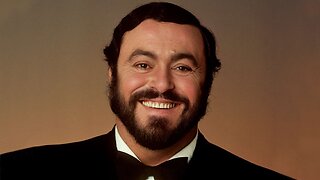 50:16
50:16
Adaneth - Arts & Literature
4 days agoLa Storia siamo Noi: Luciano Pavarotti (ENG SUB)
57 -
 10:01
10:01
Breaking Points
17 hours agoKJP GASLIGHTS On Biden's Age In BONKERS Book Tour
6121 -
 11:31
11:31
Nate The Lawyer
15 hours agoJohn Bolton Indictment Explained | Even MSNBC Says He Is in BIG Trouble!
2322 -
 25:46
25:46
DeVory Darkins
1 day ago $10.36 earnedICE raid erupts into chaos when protestors targeted ICE Agents as ABC suffers disastrous interview
9.3K28 -
 6:06
6:06
Congressman Eli Crane
19 hours agoThe "Affordable" Care Act | Democrats' Greatest Lies – Vol. 3
2.6K2 -
 1:07:05
1:07:05
TruthStream with Joe and Scott
1 day agoMorocco, Fix The World Project, EMF Protection, Camels and more! Premiers 10/22 All links below!! #502 Premiers 10/22 3pm pacific 6pm Eastern
76.6K11 -
 1:41:55
1:41:55
MattMorseTV
1 day ago $29.82 earned🔴Trump meets with GOP Senators over SHUTDOWN. 🔴
31.7K64 -
 24:23
24:23
Nikko Ortiz
2 days agoArmy Officers Might Need Help...
31.8K15 -
 6:14
6:14
Dr Disrespect
1 day agoDr Disrespect Goes for 100 KILLS in Battlefield 6
99.9K12 -
 18:28
18:28
GritsGG
15 hours agoINSANE 50 Bomb! Warzone's Most Winning Player FRIES Bot Lobby!
8.95K2

